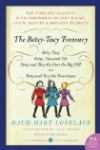11
Followers
23
Following
Reading Slothfully
I was told in elementary school that I only could read at half the speed for success in college. Oh well, one benefit of slow reading is you get to live with the characters a longer period of time. I read in a vain attempt to better understand people. At my other homes, I'm known as a spouse, pop, guy in the choir, physical chemist, computer/web dilettante and child-care provider. In theory, I'm a published author, if you consider stuff like Quenching Cross Sections for Electronic Energy Transfer Reactions Between Metastable Argon Atoms and Noble Gases and Small Molecules to count as publications. I've strewn dozens of such fascinating things to the winds.
Currently reading
Twenty Thousand Leagues Under the Seas
The Spirit of the Border
Ramona the Brave (Ramona, #3)
The Underground Man (Vintage Crime/Black Lizard)
Delilah of the Snows
Mrs. Miniver
Betsy-Tacy Treasury (P.S.)
A Christmas Carol
The Way Some People Die
Envy of Angels
The Dwelling Place of Light - Complete
 Well, first of all, I should point out the common confusion regarding the author of this book. Originally, even GoodReads had the actual author listed incorrectly. The author is Winston Churchill, the American writer who was born in St. Louis and who lived in Cornish, NH (surrounded by a bunch of my in-law relatives, no doubt. I wonder if he ever got a taste of Aunt Grace's awesome "Blueberry Goop"?) for most of his life. He was a cousin of the former British Prime Minister, Sir Winston S. Churchill. They agreed to distinguish themselves from each other by having Sir Winston use his middle initial. Bless the GoodReads librarians for clearing this up for us all.
Well, first of all, I should point out the common confusion regarding the author of this book. Originally, even GoodReads had the actual author listed incorrectly. The author is Winston Churchill, the American writer who was born in St. Louis and who lived in Cornish, NH (surrounded by a bunch of my in-law relatives, no doubt. I wonder if he ever got a taste of Aunt Grace's awesome "Blueberry Goop"?) for most of his life. He was a cousin of the former British Prime Minister, Sir Winston S. Churchill. They agreed to distinguish themselves from each other by having Sir Winston use his middle initial. Bless the GoodReads librarians for clearing this up for us all. Second of all, the nitwits at Amazon claim this book is only 226 pages. It's actually more like 400 pp. I don't know why Amazon can't hire someone competent to make up a decent page-count algorithm, but they can't. They're generally way off with their "real page numbers", often comically way off. One would think that even a not-very-bright 12-year old could come up with a better page count algorithm than the so-called engineers at Amazon. But, naturally, they don't care about quality, just "marketing and moving product".
Ok, now on to the book. It's a good one. Not an all-time classic, but well worth one's time. The book is generally considered to be a story of labor unrest. The mill workers in a small industrial city in Massachusetts are about to have their pay cut. They begin to talk strike and operatives of the IWW (Industrial Workers of the World or Wobblies) move into town and begin to organize the strike. It gets contentious and ugly over time. The basic story line of the strike follows the historical outline of the so-called "Bread and Roses" strike in the mills of Lawrence, MA in 1912. It makes sense that Churchill would use history to provide background for his story. His primary fame is as a writer of historical novels.
I also see it as a coming-of-age chronicle about an intelligent young woman who was born into a good family, but, because of her father's fecklessness, her immediate family—including her mother, father and somewhat wild younger sister—were living at the level of poverty common to the mill workers a century ago. Her father, in fact, had fallen to the ordinary mill-worker level, being the gate keeper at one of the mills. The young woman is a hard working, competent stenographer, and is motivated to become independent. She has neither the background nor the role model to support a woman's independent living. For the most part, it wasn't done a century ago. So she has to figure out things for herself, making mistakes along the way.
It's really a fairly compelling book and very well written. The book is full of "modern" ideas, modern for a century ago, but many still ones with which we wrestle today. You will also recognize that the disdain the mill bosses have for the mill workers continues to be echoed in the sneers of the likes of Mitt Romney and Paul Ryan in their political posturing today. Nothing much changes it seems. It's the fourth or fifth Winston Churchill book I've read, and I wonder why he isn't still read today. I have yet to find a book of his that isn't a GoodRead.













